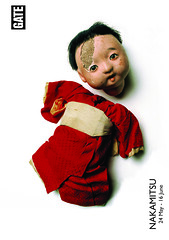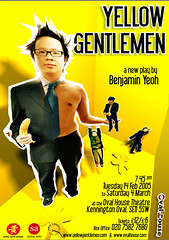Harold Pinter on newsnight
This week you can still see the Pinter interview on newsnight
Click here and on the link on the top right.
Or go here http://news.bbc.co.uk/1/hi/programmes/newsnight/5110060.stm
“Life is beautiful but the world is hell”
Definitely worth seeing before it goes off air. He’s also performing Krapp’s Last Tape at the Royal Court in October.
According to the BBC: “…What followed was an unexpectedly frank and heartfelt interview in which he talked about what his plays and poems mean to him, and his debt to Beckett – he also told a very funny story about his relationship with Beckett.
He talked about what “Pinteresque might be” and also spoke movingly about his illness and the effect on him of facing death twice.
He also laughed a lot! And then he performed a new piece of Pinter in the studio with the actor Rupert Graves. …”
Rock’n'Roll, Tom Stoppard
Occasionally, one can look ahead in to the near future and make a guess that a play will be good.
I booked ticket’s for Stoppard’s first play for the Royal Court, Rock’n’Roll, directed by Trevor Nunn, back in January.
£7.50 last night in row C in the middle and a bargain.
Occasionally, one can sit in a play and have the feeling, I am watching a ‘great’ play.
I say ‘great’ as Rock’n’Roll touches and interweaves many themes to instil a feeling of the epic and of the intimate, in the way great plays do.
To me, this is Stoppard’s best since Arcadia and it shares three things (amongst others) in common, that I find fascinating.
It has a love story (actually several) and celebrates the human spirit of love.
It has a very clever young girl in it.
It has a recluse (possible genius) in Syd Barratt.
I’m not sure the precocious young girl character is exactly relevant, but I liked the connection. Some times some characteristics skip a generation, some times ideas are lost until they find the right time and place to reappear, but if they are great they will reappear (a riff on the theme from Arcadia) and even sometimes characters will skip a few plays (is Alice, a Thomasina for our generation?) and reappear? [Alice has a maternal attitude to Syd cf Arcadia]
Perhaps, I shouldn’t get so hung up on the pretty young actresses (boys will be boys), although Alive Eve does well with her parts (she doubles up a character, another Stoppard device) and isn’t outshone by some extremely good acting particularly from Rufus Sewell (Jan), Brian Cox (Max) and Sinead Cusack (Eleanor/Esme). [Critics have noted a slow pace on the night they saw it, I think it has probably sharpened since then and will sharpen further by the time it hits the West-end – I certainly wasn’t bored or fidgety]
The critics haven’t the space to be very insightful, in my humble opinion, it is a large and complex work and as one critic says “over-stuffed” but it wouldn’t be Stoppard if it wasn’t. Michael Billington [here] and Susannah Clapp [here] have perhaps the best insight and John Peter (Sunday Times, not avail on-line) the best sum up.
Without over simplifying it, I think most people have sussed that the major theme of the play, is in the title
Rock’n’Roll
[as an aside, It’s worth noting that many great plays seem to sum up their entire themes in the title somehow: Death of a Salesman, A Street Car Name Desire…]
I would like to know Stoppard’s experience of gigs because he touches on spirit of the greatest of gigs (those that start a revolution?) and drags it into the theatre.
I’m still reverberating from my Radiohead experience (see earlier post).
And with that notion, I can see why a whole country’s system can be undone by the expression and freedom as expressed through Rock’n’Roll – and how it can thread through our lives (as it does the characters) binding them in days and nights of love and war.
So, Rock’n’Roll is about Rock’n’Roll.
This umbrellas many other themes and the source for much of this is in the letters and work of Vaclav Havel.
The former President of Czechoslovakia and celebrated writer in his own right, saw it on the first night (along with many other famous people) and said:
“I think this is a wonderful play. The performances are very subtle, it’s cleverly written and it works very well on the stage. I enjoyed it immensely.”
A good job too.
And so, Stoppard shows us how a love for Rock’n’Roll and a belief in the band the Plastic People of the Universe can lead to Charter 77 and a revolution.
And on the way riffs upon
Sappho; fragments, translations, the structure of poetry, the structure of Stoppard’s own play (vs Utopia)
How history repeats itself, or not; Sappho, doubling of characters, the learning of Greek, the studying of Sappho, the falling in love (the repetition of themes of Stoppard’s other plays)
Revolution; communism and the left vs. all comers – see Havel, Thatcher, 1968
Freedom; the responsibility which comes with it, the erosion of freedom,
“This place has lost its nerve. They put something in the water since you were here. It’s a democracy of obedience.” The past vs today, how to fight for freedom
Materialism; also see Havel, Thatcher
Vinyl; if you think the ipod is the only alternative, you won’t get this
And love;
For what would Rock’nRoll be, if not for love
So, of course, it’s about more than Rock’n’Roll, it’s about being human.
*
PS I have found a detailed and good article with Stoppard in the Guardian on this play. Much better than the short critic reviews. Go here.
Writing to time
Have been very squashed for time on various projects. Currently, I’m finishing off the first draft of a radio play and I am trying to get the page count to fit 58 – as this would be 58 minutes or so – rather than the 48 I am currently on.
It is also easier to cutback than to add (I find at least).
Having written mainly for theatre and not tv, having strict time lengths is a different restriction to ones I’ve been used to. However, it does really make you think about whether scenes are unneeded fat or requisite story.
Many plays afoot. I’m seeing the new Stoppard next week (Rock’n'Roll) and hoping to see Market Boy soon, but not sure when as well as many other things.
Typically, I am going to miss the Michelangelo at the British Museum as I do most major art exhibitions. And I really want to make it to Princelet street this week but again I am not sure when. If you are intrigued by an old Huguenot house where also in 1869 the Jews erected a synagogue then go this week, it’s near Spitalfields.
For all the joys of the country, I think I’d miss not being spoilt for choice for everything London has to offer.
Changeling
Went to see Cheek by Jowl’s version of the Changeling. There are podcast interviews here. It has Olivia Williams in it, who looked famous and then my companion told me was famous. She was in The Postman and Rushmore. Anyway, fame generally passes me by. She did a good job with a difficult part, well counter pointed by Will Keen as De Flores.
Still, what is it with chairs at the moment (see my review of Motortown)? At least these ones didn’t dance, although were pretty integral to the design which was on the whole extremely good.
The brilliant conceit here, was to integrate the mad house plot so closely with the main plot that the suggestion is that the main protoganists are verging on madness and that is what inspires them to so much death and sex and plotting.
Michael Billington reviews it here.
Exposure of young writers: Moses Raine
I saw Shrieks of Laughter by 21 year old Moses Raine at the Soho Theatre on Saturday.
I thought Maria Aberg did very well directing a difficult play. Difficult because there were many gaps which the actors and directors had to fill and which the playwright did not fill. Moses Raine’s voice, language and ideas certainly merit performance in my mind.
However, there was some criticism that Raine had been exposed too early. In fact, Mark Godfrey from the Soho had to write to the Guardian to defend the Soho’s choice.
Even given the mitigating circumstances of Raine growing up with a poet father (Craig Raine) and director/writer older sister (Nina Raine) and presumably a heightened awareness of artistic exposure, how on earth is a young playwright expected to learn if he or she does not go down the process of putting on a play?
Theatre unlike many other arts is only “finished” as a performance. You can’t properly read it or go to it in a museum.
I posit what Raine would have learnt from the whole process would more than outweigh any negatives from exposure. And besides as long as people are broadly constructive when engaging with Raine’s work, then I see no downside.
We must continue to bring new writers and directors and give them work and places to perform or how else can we learn?
Stoppard, Hear & Now
Interview with Stoppard on his latest work here.
Tom Stoppard along with Harold Pinter, Caryl Churchill, and Alan Bennett are among the only 4 playwrights which can virtually guarantee a sold out National Theatre. I guess one could add Mike Leigh to that list, although he works in theatre so rarely now.
Saw Hear and Now at the Gate. Michael Billington reviews it with the words “More matter with less art” at the start of his review.
I’d just pick up on some thing I liked about the show which were some of its visual ideas, particularly the window frames that the character picked up and opened, as if speaking from inside their houses, but I’d have to agree with Billington that I didn’t learn “anything much about the new South Africa”. Not sure I was meant to.

